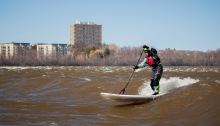The power and potential of blue space
Chad Guenter, a firefighter and rescue instructor in Canmore, Alberta, stands six-foot-three, weighs 250 pounds, and is covered in tattoos. He has seen a lot of troubling things while working: a seven-day-old baby who died of cardiac arrest, the bodies of three railroad engineers he helped recover from the crumpled wreck of a freight train.…






